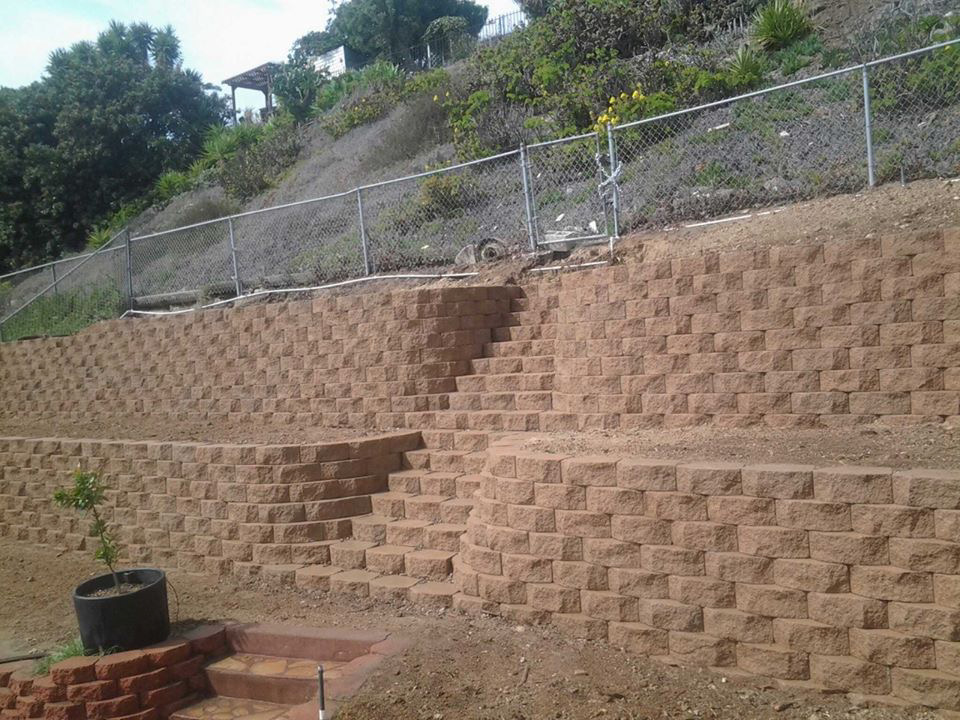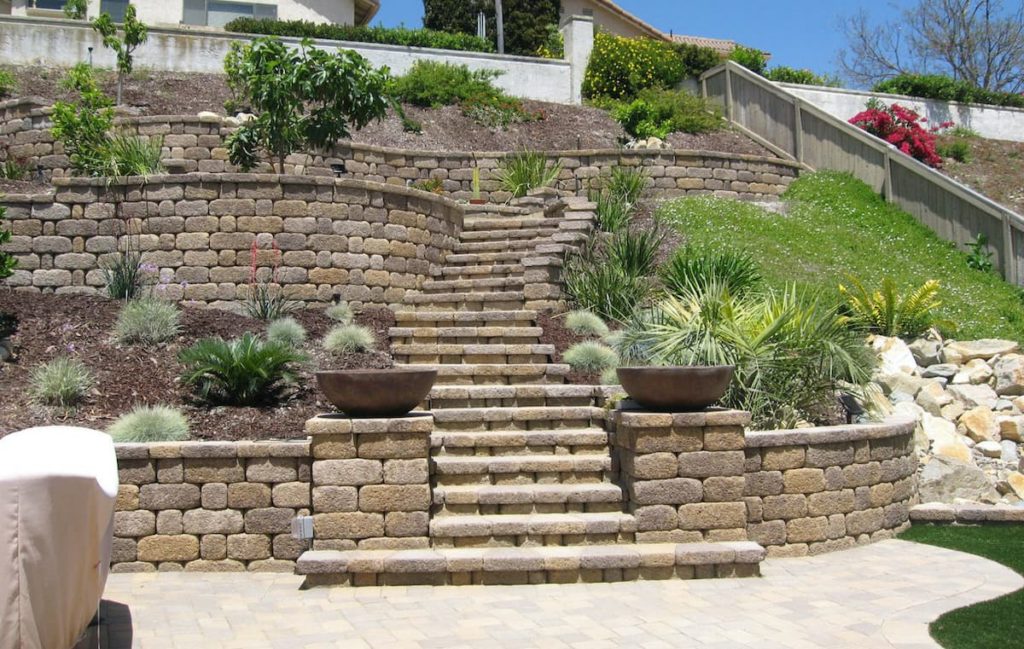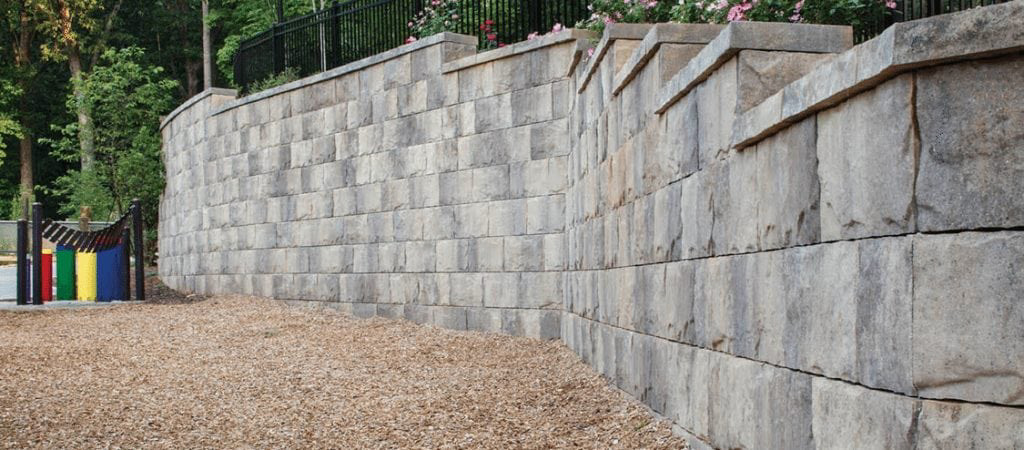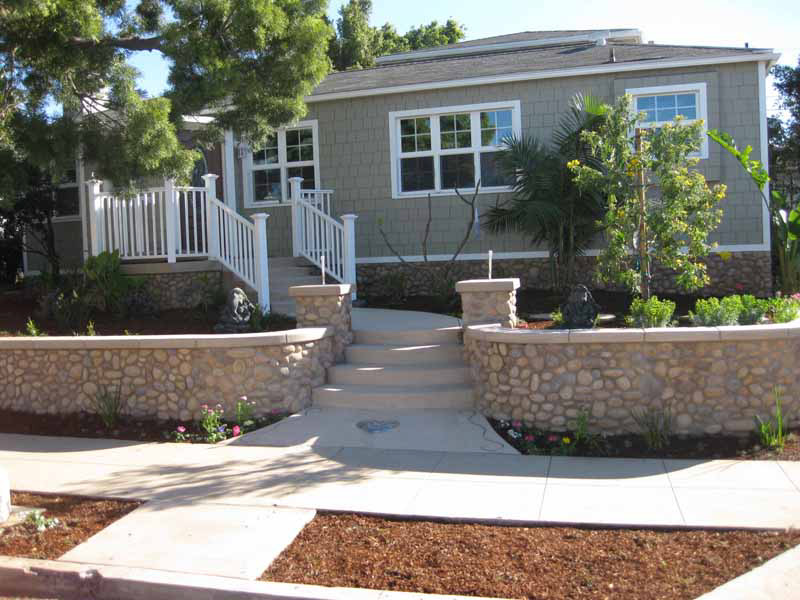A retaining wall can be a need for a variety of external landscaping jobs, and they serve a range of functions. A few of the most common functions of a retaining wall consist of:
While these are the typical functions of a retaining wall, there are plenty more. When a property consists of a retaining wall, it's frequently a noticeable element to the landscaping style, and they are often made to not only satisfy their purpose but also to include a pleasing aesthetic.
Retaining walls can be quite pricey, however there are several materials and design choices offered to finish your retaining wall job no matter how big or small your spending plan is.
In this post, you'll learn:
We will give you 5 things to keep in mind when discovering a retaining wall that can work within your spending plan. Let's get started!

The last expense of a retaining wall depends upon materials used, labor and setup costs, along with the size of the wall, to name a few elements. While a lot of house owners will spend between 3,200 - $8.650, the average expense of developing a retaining wall is approximately $5,500. In terms of product, wall blocks are cheapest, sitting between $10 - $15 per square foot, wood will sit at approximately $15 - $25 per square foot, and poured concrete expenses anywhere in between $20- 25 per square foot. The typical expense of retaining wall building products varies in between $3 - $40 per square foot.
The bright side is that you have a great deal of control over this cost point since you ultimately get to decide what your retaining wall is made of. The secret here is to discover something that works with your aesthetic and is most functional for your specific task.
It probably won't be a really cost-effective decision if you selected a low-cost material like wood for a project that will have a high direct exposure to moisture in time. The life expectancy of your retaining wall will be substantially decrease, costing you more in the end.
When selecting products, ensure that you and your retaining wall contractor keep these consider mind as each job has various requirements and needs; if you require the recommendations of a professional, don't hesitate to ask to ensure your final decision is a good one.
If you select a low-cost product that declines and fails with time, you'll have to pay more in the long term.
All of the costs that you'll find in this area is for the structure material only; we'll discuss additional expenses as required along with consist of respective sections on wall installation type and labor price quotes later on in this short article.
Corten Steel/ Metal $ 3-$ 4
Earth/ Chalk $ 3-$ 27
Gabion $ 3-$ 40
Boulder/ Rock $ 8-$ 12
Concrete block $ 10-$ 15
Stone Veneer $ 11-$ 15
Brick $ 14-$ 15
Wood Timber $ 15-$ 25
Poured Concrete $ 20-$ 25
Imitating the look of natural stone, stone veneers are relatively cost-efficient. You can also accomplish many different looks in regards to design and color given that there are a lot of combinations and alternatives readily available.
In addition to color and style alternatives, their look is very natural, so they can fit a range of various property designs.
You'll require a base with a stone veneer retaining wall, and this core can be produced with long lasting and strong materials such as poured concrete or concrete blocks for a good, strong wall.
Other base options consist of sheet metal, brick, and wood.
The veneers itself are quite budget-friendly, ranging from $3-12 when made from made stone; if you're trying to find a natural stone veneer, you'll be taking a look at $8 and up. A property owner wanting to utilize stone veneers is most likely going to fall within the $11-15 variety, typically.
These walls are extremely durable due to the strong base, and they also aren't vulnerable to pest issues or decomposing. Considering that they are lightweight and low upkeep, the installation expense is going to be lower than genuine, full stone walls.
Even still, to guarantee the task is done effectively, a landscape architect must be generated for setup and application, and this is where the cost might rise. You're looking at a hourly rate of roughly 70−70- 150 for a landscape designer.
In many cases, they will take your general project budget and charge you a set portion.
This isn't a material that is first considered for retaining wall jobs, particularly in a natural or residential landscape, but metal materials can produce efficient and resilient retaining walls.
The rate is also right at approximately $3-4 per square foot. The most typical products consist of steel, Corten steel, and aluminum. They are water-resistant, lasting, and also strong.
All options are generally offered in plate and corrugated type so that property owners can select based on taste and general appearance.
Corten Steel: The most affordable choice comes in at $2.50 to $3 per square foot; this material will look rusted due to oxidation, which likewise adds a layer of security against weather and erosion. It lasts a very long time with low upkeep but is finest for a rustic visual due to the oxidation. Steel Plate: This choice will cost you more or less $3 per square foot, or $10 per panel. The great feature of steel is that it's unaffected by weather and insect issues, so it will not end up being rusted or eaten away. Climate will not impact steel, and it's also really strong regardless of its light-weight nature. Aluminum: Very comparable to steel, you'll find aluminum at approximately $10 per panel too. With an even lighter weight than steel, you'll likewise delight in no upkeep or rust, and it's even installed normally when there is a requirement for a water barrier.

Solid Retaining Walls of San Diego
4443 kansas st, #6, San Diego, CA 92116
https://sandiegoretainingwalls.com
(619) 514-2384
Cinder block walls are excellent for brief walls; since they are not protected in the ground with footings, the recommended height is no higher than 4 feet. Even still, when you require to keep a great deal of soil, cinder block is an exceptional choice. It's a versatile alternative that will also permit you to implement curves into the style of your wall with no additional monetary expenditure.
A low-maintenance and resilient structure alternative, a concrete block wall will cost you from $10-15 per square foot. This makes it a fantastic long-term alternative, with fast setup and a resistance to rot, fire, and other components.
There are also interlocking cinder block, likewise referred to as modular concrete blocks, that are similar to cinder blocks but with interlocking features for even simpler installation. This is among the principal benefits of both interlocking blocks and normal cinder blocks.
In terms of style and appearance, they have lots of alternatives for color, and if your budget is a bit bigger, they can even look more like natural stone. In some cases you can even find ones that look weathered, mosaic, or patched, depending on the manufacturer.
A fan favorite for use in gardens or natural-looking residential or commercial properties, wooden retaining wall products will fall in between 15−15- 25 per square foot. They are usually the most economical service, however they can also be the least durable sometimes.
Wood has a fantastic natural appearance, and you can definitely discover stunning ranges that are at a higher price point, but there are some disadvantages depending on your particular project. Water and insects greatly affect wood retaining walls, which will decrease the life-span of your retaining wall.
It's essential that there is proper waterproofing of the material, along with pest control; there likewise need to be effective drainage or water damage will eat away at the wall. If you take this into account from the beginning of your job, they can quickly last for 20 years or more.
One of the most popular choices for wood is making use of railway sleepers and ties; they use an intriguing visual and have cost-effective materials. We'll discuss this more in detail in the installation area.
Wood retaining walls are likewise indicated for much shorter walls, sticking to the exact same recommendation as concrete block walls: 4 feet.
A traditional look and a traditional product, brick is lasting and reputable for your retaining wall requires with high levels of strength and efficiency. Bricks walls will cost approximately $14-15 per square foot, but there will likewise be expenses for other products, such as mortar.
In addition, sometimes this might take longer for installation in comparison with other products, and often needs an expert that understands about laying bricks. You'll also require a design that considers drain so that it does not fail due to water damage in the future.
Often popular for contemporary styles and similar to concrete block in resilience and resistance to the aspects, poured concrete walls normally cost 20−20- 25 per square foot, consisting of installation and materials. While it is more expensive than cinder block, it's also much stronger.
Poured concrete is more typical for commercial and commercial tasks typically due to its modern-day visual and the capacity of high installation expenses. What's more, if the concrete becomes broken, the entire wall may be at danger of failure, which implies it needs to be eliminated and replaced.
For these reasons, in addition big footings for poured concrete retaining walls, they are not a typical alternative for residential projects.
Varying significantly in costs, chalk and earth products are often popular for their sustainability. You can expect these products to cost anywhere between $3-27 per square foot.
The two typical kinds include compressed earth blocks and rammed earth walls. Rammed earth walls are produced using a framework to form a large piece, and this material will cost you more, ranging from 23−23- 27 per square foot.
Compressed earth blocks are entirely different, and way cheaper. These are made separately and will cost you as low as 0.50−0.50- 1 per block, or 3−3- 7 per square foot.
While the costs are low, these products need to be reinforced and normally have a concrete piece that includes stability. They are also prone to water damage, so waterproofing is necessary if you want a lasting wall.
Labor is greater when it comes to chalk and earth products.
Frequently used on banks near lakes or oceans, Gabion can move and adapt with the soil instead of breaking. This product will run you anywhere from 4−4- 40 per square foot, but must include electrical wiring or wire cages, costing 30−30- 40 per cubic backyard.
There are lots of filler products to choose from, consisting of stones, wood, and crushed concrete-- this option will impact the total rate of your Gabion retaining wall, however they are generally easy and budget-friendly in regards to setup.
A popular product, rocks and boulders are not always that pricey by themselves. The issue is that the labor expenses are amongst the highest, enhancing the total expense to $25+ per square foot for stone and rock walls products + installation.
They are gorgeous, more eco-friendly, along with natural, but because they are very heavy and more difficult for installation functions. For instance, brick will cost you about 15−15- 25 per hour for installation, whereas dry stacking stones run at $65+. As you can see, they come at a price.
They are likewise not ideal if water control is a necessity of your retaining wall jobs, as building and construction techniques frequently permit free-flowing water in between stones.
Some common stone products consist of: Limestone: A typical option for its sturdiness and strength, Limestone can be easily found in sizes that associate; this is suggested for increased stability. They are of a cream color, using a pleasing visual. Sandstone: There are a lot of color choices when it concerns sandstone, as it is composed of sand and minerals. It's a bit softer than other stones but is much easier to deal with and simple to find; nevertheless, for environments heavy in wetness, this material might not work best. Dry Stone: a mortar-free stone wall, dry stones are stacked strategically so that they are safe and secure and avoid landslides. Once again, water control is a challenge with dry stone walls. Keystone: A stable option, this brand of stones provides you a huge selection of choices for colors, styles, and styles, and consist of a pin system that permits steady stacking and durability. They have the ability to be stacked greater also, so you can utilize them for numerous kinds of wall tasks and sizes.

Solid Retaining Walls of San Diego
4443 kansas st, #6, San Diego, CA 92116
https://sandiegoretainingwalls.com
(619) 514-2384
A typical labor cost variety falls between 53−53- 60 an hour; this can be increased rapidly when you factor in a range of different components.
Things like the size and height of your wall will impact labor expenses, as well as ease of site access along with any demolition that is needed in order to get started on the job or bring essential products.
If there is extra external disposure of materials when the job is done, that will also factor into your labor costs.
Typical Labor Cost Per Hour: Wood $ 15-$ 75 Stone Veneer $ 30-$ 75 Stone $ 60-$ 75 Concrete Blocks $ 60-$ 75 Dry Stacked Stone $ 60-$ 80 Poured Concrete $ 60-$ 80 Brick $ 60-$ 90
As you can see, the potential for high labor expenses exists across all materials, so it's finest to speak with the differences with your particular contractor when considering materials and expenses.
For instance, while brick is less expensive as a material, the labor can cost more due to the lengthy nature of laying brick, and you'll likewise require to spend for things like mortar.
It's always best to discuss all of your choices and the specific requirements of your job prior to choosing a product.
There are some other costs that you may encounter, such as acquiring reinforcement products or tools that are needed for the job.
When these costs occur, you're looking at a rough price quote of about $1 per square foot. While you might not need to deal with any additional costs, it's always an excellent idea to have a cushion in case something unforeseen emerges.
Discuss this possibility with your retaining wall contractor before your job starts.
There are different types of retaining wall setups, but typically, prices range from 15−15- 40 per square foot, with some walls more budget-friendly than others.
When a retaining wall is developed for ease of installation, you'll find that the cost will be more economical; for instance, obstructs with interlocking style or stones with pins are simpler to set up.
Railway Sleepers This wood product is often simple to set up and affordable. Including both material and labor, your overall expense can be as low as 25−25- 30 per square foot.
There is very little additional products or tools needed for the task; they fit rather quickly, and they can even extend a bit over the 4 ft. suggested height of regular wood retaining walls if crafted correctly.
Interlocking Another option that is easier on the wallet, interlocking blocks are frequently utilized for simple installation because they conserve both time as well as expense for equipment. The products are relatively budget-friendly.
The price for interlocking blocks consisting of material and labor will run you in between 15−15- 30 per square foot.
Rammed Earth As we saw in previous sections, this material type by itself is quite cheap, but the labor increases the general task cost considerably.
Compressed earth blocks are not going to have this issue, as they are approximately 15−15- 25 per square foot consisting of products and labor, just like cinder block.
Rammed earth costs more due to the labor and care that enters into the setup, costing approximately 30−30- 40 per square foot for both labor and materials.
There are a couple different reasons that you might require to fix or change a retaining wall, and all of them are typically associated with bad preparation or bad construction. It's important that you assess your job and catch problems early so that you do not have to struggle with high reparation expenses.
Some things you wish to search for consist of:.
There are lots of things that can be done at the time of building and construction that assist to prevent problems. Footing ought to be deep sufficient to withstand soil modifications. Pressure should be properly prepared for or tilting, and collapse will be unavoidable. If low-cost materials or improperly waterproofed ones are utilized, the entire wall may require replacement due to weathering and disintegration. These are just a couple of examples.
Reparations for retaining walls can be pricey and lengthy. It's better to consider all of these aspects before the task so that you do not have to remedy anything later on.
In some cases, it'll be required to replace the entire structure. If you find yourself in this scenario, you'll also need to consider the removal of whatever you have left and after that the restoring.
Here are some typical costs that are involved with retaining wall replacements.
Service $ 160-$ 250.
Land Grading $ 0.50-$ 3 per square foot.
Concrete demolition (put concrete or bases) $ 4-$ 8 per square foot.
Drain setup $ 0.50 per square foot to $70 per direct foot.
Landscape designer $ 70-$ 150 per hour
Products $ 3-$ 45 per square foot.
Labor $ 53-60 per hour.
Take preventative procedures to avoid retaining wall repair work and replacement.

Solid Retaining Walls of San Diego
4443 kansas st, #6, San Diego, CA 92116
https://sandiegoretainingwalls.com
(619) 514-2384
When choosing how much your retaining wall will cost, there are 5 key factors to consider that you'll wish to make. Below we will provide you some ideas on how to make the very best decision for your task.
When thinking about retaining wall cost, you need to consider your total possible spending plan. Be realistic about just how much you can invest; you could invest as low as $3200, or you could invest up to $9,000 or more. Commercial retaining wall projects may cost $15,000-$100,000.
Discuss your alternatives and recommendations with a retaining wall professional so that you can make educated decisions and execute proper planning.
You will need to make key decisions about what sort of product works best for your visual in addition to performance. Remember, each task is different, so there isn't one "finest" material, as each kind of product is affected by weather and pests differently.
You have no lack of options in terms of materials, so think about what will work best for the size of your project, just how much you can invest in materials, along with how you desire it to look and be designed.
For instance, if you're trying to find curves and your wall job is 4 feet or under in height, concrete block or interlocking concrete blocks might be your choice.
Think about the installation type when considering products; this will also impact how simple your task is and how much labor will cost.
Labor can be affected by various requirements of materials; if you're trying to find fast and easy installations, interlocking blocks or wood are going to be the simplest and quickest to get set up.
Products like brick or dry stacking stones are going to cost you a lot more in labor due to the workforce needed. Keep these factors in mind if you want to save on labor. Your specific job needs also impact labor, including style elements along with drain requirements.
You want to think about the product that you chose and constantly keep in mind external factors such as weather, pests, load capability, and drain.
You must also make sure that the footings are correctly set up, the soil was checked, which the pressure was accurately determined so that you do not have to handle costly repair work down the line.
Various factors play into the life-span of retaining walls.
When utilizing wood, keep in mind that it must be properly treated and waterproofed if it is going to stand the test of time.
There are numerous factors that play into the style and building of retaining walls that preparation and proper consideration prior to building starts is absolutely essential. Take the time that you need to decide on products and size, as well as proper screening and developing.
It's finest to use a professional contractor to install your retaining wall both for security and success, so if you choose to invest in one location over another, let it be expert consultation and construction.
All in all, the average retaining wall expense is approximately $5,500, however retaining wall expense varies significantly depending on job size, products, labor, and other factors. Preparation successfully and seeking advice from specialists to ensure that your task is performed properly is the very best method to guarantee that you get the most out of your retaining wall financial investment.
You do not want to have to buy repairs or total replacement later on, so making wise and thoughtful decisions when preparing for your retaining wall can save you a lot in the long term.
Solid Retaining Walls of San Diego
4443 kansas st, #6, San Diego, CA 92116
https://sandiegoretainingwalls.com
(619) 514-2384

